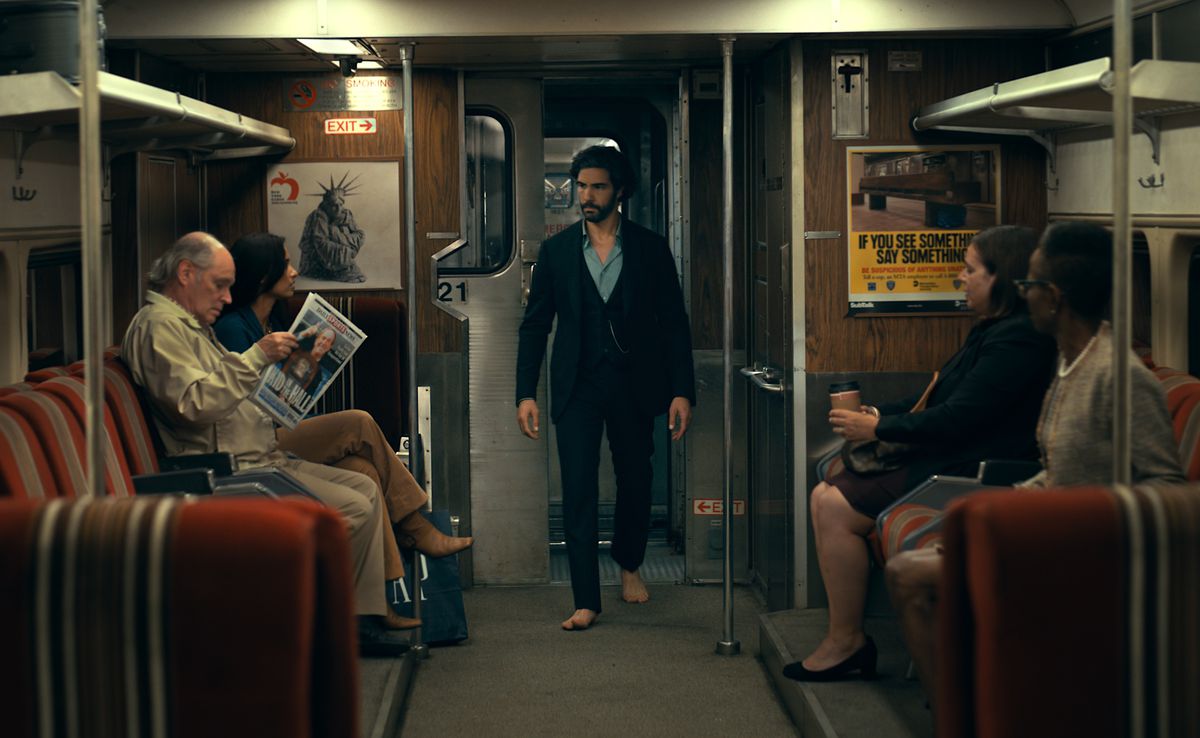Sony’s baffling Spider-Man Universe movie Madame Web leaves a lot of questions behind, some of them entirely practical (are we ever going to see all these young heroes actually gain their powers and… become heroes?) and some of them much more the kind of fandom debate-squad fodder beloved on Reddit. (Will there ever be a Spider-Man in this particular wing of the multiverse, or will Cassandra save Adam Scott’s Uncle Ben from being senselessly murdered, since he’s basically family?)
You could spend all day talking about the weird implications Cassandra’s future-vision has for the SSU, or discussing whether it’s the first story in history where someone acting to avert a prophecy doesn’t just enable that prophecy instead. But those aren’t the questions that bothered me throughout the movie. I was stuck on a more central plot point. How the hell did Madame Web’s villain become rich?
[Ed. note: Spoilers ahead for Madame Web’s plot setup.]
Image: Columbia Pictures
Madame Web’s flashback prologue finds the heroine’s mom, Constance (Kerry Bishé), where we expect her to be: researching spiders in the Amazon before she died. We see her die, in fact, after being shot by the villain, Ezekiel Sims (Tahar Rahim), who wants to steal the extremely rare spider she’s just discovered. As he tells her immediately after his sudden but inevitable betrayal, in a wee little villain speech that encapsulates virtually everything we get to know about the man, he has to steal it because it’s his only road out of poverty. He didn’t grow up with the same kinds of choices she did, he tells her self-righteously.
The next time we see Ezekiel, he’s living in a vast NYC penthouse, all floor-to-ceiling glass and startling city views. He’s wearing expensive suits and seducing beautiful women at the opera. His stolen spider lives in an elaborate custom jungle habitat that’s lusher than half the apartments in Manhattan. He’s clearly coded as the kind of smug, evil millionaire the movies love to hate. But how did he turn spider-possession into a cash concern?
I know, to a lot of people, this is going to seem like a tiny, irrelevant detail. It’s hardly the biggest hole in a movie that’s mostly nonsense, sequel teases, and random but prominent 2003 references, like the building-sized mural proclaiming the release of Beyoncé’s Dangerously in Love. But it’s a more telling detail than it appears to be, because it’s so absolutely basic to the story, and it’s a question the screenwriters can’t be bothered to answer. Who the hell is Ezekiel Sims? What’s he been doing for the past 25-ish years? What does he want out of life, besides to kill some girls he keeps dreaming about? Does he have any existence whatsoever outside his plot function as an often-faceless threat?
How do you turn a single secret spider into a vast fortune?
The ridiculous thing about it is that there are potential answers — and any of those answers would say something interesting and worth knowing about our villain. The spider’s bite has given Ezekiel some of Spider-Man’s core powers: He can’t spin webs, but he can crawl along walls or ceilings, and he’s durable enough to get up and shake off two different instances of being mowed down by speeding vehicles, with no sign that he took any lasting injury. There’s probably a way to turn spider-powers into cash, maybe by becoming a renowned, dashing, Cary Grant-style jewel thief, or just by winning wrestling matches, as Peter Parker does in a lot of Spider-Man sagas after discovering his radioactive-spider abilities.
Or it’s just as possible that Ezekiel has somehow made money off the supposed disease-curing effects of the spider’s venom. That’s why Constance was researching spiders in the Amazon before she died in the first place, because of legends of the venom’s healing properties. Maybe he’s become the world’s first spider-based pharma bro, dealing out miracle cures from his secret single-spider factory in his penthouse.
Except… there’s no sign in this movie that he has the knowledge or connections to enter the pharmaceuticals market, or that he’s radically changed the world by curing cancer via spider venom. If he’s just peddling spider-bites to extremely rich people on their deathbeds with otherwise incurable conditions, there would be a lot more superpowered spider-people running around.
How do you get from “I have a spider” to “I have millions of dollars”? It nags at me because it feels like an Underpants Gnomes business plan that actually worked, no matter how ridiculous that sounds.

Image: Columbia Pictures
When in doubt on the backstory of a comics-based character in a movie, the usual answer is to look back at the source material. I asked our resident Polygon comics superfans who Ezekiel Sims is, really, and how he supposedly got rich off being able to climb walls. They said, in effect, “We dunno.” “The comics are similarly vague!” Joshua told me.
Dipping into Marvel’s database and supervillain fan wikis didn’t help either. “He used his powers to create and develop a corporation” is about as specific as it gets. I guess wall-walking and having contact-poison hands would come in handy for corporate espionage and taking out the competition.
But that still leaves all the same questions: What’s this guy do? What does he care about? What’s he good at? What’s his deal? Judging from the way he treats his one operative, Amaria (Girls’ Zosia Mamet, in a thankless role as “woman who sits in front of a lot of screens and offers periodic status reports”), he doesn’t have any soft business skills or any vision, apart from the idea that if he yells “Get results, now!” at his underlings, they’ll suddenly overcome all their obstacles. I can certainly buy this guy as the head of a modern corporation. But the creator of one?
I understand why the screenwriters didn’t think any of this mattered. Ezekiel in this movie is a one-dimensional bad guy whose purpose is to threaten the slightly better-realized leads. His big story function, apart from basically being the implacable pursuit-monster from It Follows, is killing the heroine’s mom, which both sets the plot in motion and gives her the classic action-hero excuse for killing him in return, or at least purposefully engineering his death. (Which doesn’t quite explain why the story suggests the movie’s teenage superheroes would also be fine with coldbloodedly murdering him, but I guess that’s just a dream, or an averted future that never comes to pass. Assuming this movie doesn’t get a sequel.) It really seems like no one involved with the movie thought he needed more of an identity than “climbs walls, is rich, hates the heroes.”
But what’s the point of a supervillain who doesn’t have any obvious real-world skills or connections, any meaningful personality or purpose, any thematic or symbolic weight? And on top of that, who doesn’t seem particularly smart or skilled or threatening? The best supervillains are dark mirrors of their hero nemeses, illustrations of how easily a hero might go wrong. The most memorable villains are the ones with personality, flair, or at least a sense of menace. All of that requires some sense of specificity, some sense of a goal, a plan, a cause, or at least a recognizable space in the world.
Instead, Ezekiel has a spider, and money, and a weirdly hand-waved connection between them. Even by the haphazard standards of mediocre recent superhero movies, that isn’t much to hang a story on.

